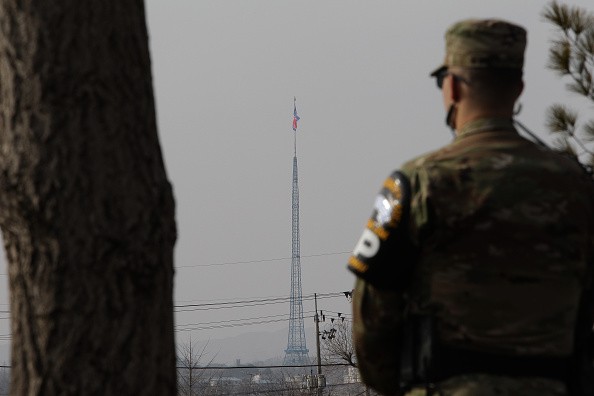China’s Ministry of Foreign Affairs on Wednesday said the country will "by no means allow war on the Korean peninsula" and emphasized Beijing’s concern over Pyongyang’s announced plan to launch a satellite later this month, only weeks after it tested a hydrogen bomb in defiance of international sanctions.
"The DPRK has the right to make peaceful use of space, but this right is subject to restrictions of the Security Council resolutions," Lu Kang, a spokesman for the foreign ministry said in a press briefing in Beijing on Wednesday, in response to reports that North Korea is planning to launch an "earth observation satellite" sometime between Feb. 8 and 25.
Lu advised North Korea to exercise restraint but warned other countries against taking any action to escalate tensions in the region.
"We will by no means allow any country to pursue its selfish gains while the international community is working for the target of denuclearization," Lu said.
North Korea's satellite launch plans, revealed by the International Maritime Organization (IMO) on Tuesday, came on the same day as Chinese special envoy for Korean Peninsula affairs, Wu Dawei, flew to Pyongyang for the first time following the North's detonation of a hydrogen bomb on Jan. 6.
Wu remains in Pyongyang, "exchanging views with the DPRK on the current situation of the Korean Peninsula," Lu said without further elaboration.
The foreign ministry spokesman also responded strongly after a journalist asked for a comment on U.S. Assistant Secretary of State Daniel Russel's remarks that North Korea's latest move is a "slap in the face" to those arguing for more sanctions.
"As the chair of the Six-Party Talks, the Chinese side has made strenuous efforts to make genuine progress in denuclearization and encourage all parties concerned to reach aforementioned consensus," Lu said.
"During the stalemate in the Six-Party Talks, in response to relevant countries' constant outcry for pressure and sanctions, the DPRK started nuclear testing and conducted them over and over again. In this sense, the DPRK did slap the relevant country across the face. As to whose face the DPRK slapped, the country itself knows well," he added.
The Six-Party Talks have been suspensed following North Korea's withdrawal in April 2009 in protest against the U.N. Security Council's condemnation of North Korea's satellite launch 10 days earlier.
Any satellite launch by North Korea would be viewed as "another destabilizing provocation" and "argues even more strongly for tougher U.N. sanctions," Russel told the press on Tuesday.
Japan placed its military on alert on Wednesday, while South Korea warned the North will pay a "severe price" if it goes ahead with the satellite launch that Seoul considers a ballistic missile test.
If the North does launch a satellite, Lu said that the corresponding sanctions will be catastrophic and depress the country's economy even further.
Analysts, however, dismissed fears that the launch could lead to direct conflict.
The present tensions are unlikely to evolve into direct confrontations by the U.S. or Japan other than making tough statements, given that South Korea will be caught in the aftermath, Gao Fei, a professor of Russian studies at the China Foreign Affairs University, told the Global Times.



























